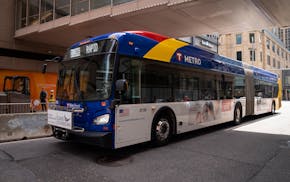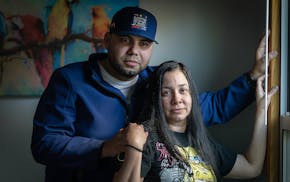Luis Juárez said he fled political persecution in Venezuela four years ago, bringing his wife and son with him to Minnesota. The family was among the many Venezuelans granted temporary protected status (TPS), as the former Biden administration described a "severe humanitarian emergency" under the regime of President Nicolás Maduro.
Now the fate of families like his is in limbo after the U.S. Supreme Court decided this week to allow President Donald Trump to revoke legal protections for some 350,000 Venezuelans covered by TPS while a legal battle over the program plays out in a lower court. The administration had moved to allow TPS to expire for many Venezuelans in April — saying it is contrary to the national interest to allow them to remain — and the top court lifted a California judge's ruling to put those plans on hold.
"I want to be here until Venezuela becomes a country where I can go back home," said Juárez, 38, from his living room in St. Paul.
Juárez has now pinned his hopes on an asylum case he filed with U.S. Citizenship and Immigration Services (USCIS) last fall. An earlier asylum claim he filed in immigration court was closed, he said, after the court learned that he received TPS in 2023.
Venezuelans are the third largest nationality represented in Fort Snelling Immigration Court, where they had 4,130 pending cases as of March. The Congressional Research Service reported last fall that about 4700 immigrants have TPS in Minnesota, though it isn't known how many are Venezuelans.
After settling here in 2021, Juárez took a job as a Spanish teacher at a Catholic school; his wife, Mayrink Cumana, works as a cook at a daycare. As Juárez recounted their struggles in Venezuela, Cumana, 47, stepped out to pick up their 16-year-old son from tennis practice.
"I think the government should really research the people they're about to deport," said Juárez. "I believe that a lot of people that are getting deported don't have criminal backgrounds and they have a lot to contribute to this country. … A lot of Venezuelans, like in my case, are educated and professional people."
Growing up, he always wanted to join the Venezuelan military.
It was a respected profession, he said, and he graduated from the military academy in 2010. Juárez's job involved the inspection and maintenance of military aircraft.
"Everything was good until the corruption and the injustices," Juárez said. "And because I was a low status officer, there was nothing I could do."
He said the trouble started around 2013, when President Hugo Chávez died of cancer. Maduro, then vice president, took over the presidency and later won a special election. Food, gas and medicine became harder to come by, according to Juárez, and military officers were ordered to take part in corrupt political schemes. For example, he said, his superiors ordered him to follow the directions of a mayor involved in a scheme to sell overpriced insulin, propane and food to mine workers. Juárez said he tried to push back, but insubordination in the military was a crime.
"There is so much corruption — we would have to sit here for three hours talking about all the corruption," said Juárez
Cumana recalled that she was "very worried" at the time.
Juárez recounted how problems escalated when superiors tried to pressure him to give positive inspection ratings to planes that he determined did not meet safety requirements. Juárez said his colleagues began to regard him as an opponent of the government, a dynamic that worsened after he wore a shirt that said Primero Justicia, meaning Justice First.
He alleges that one evening in 2021 as his family was watching TV after dinner, a group of masked men broke into their home and beat him, seriously injured his son, and took him to a military base where he was beaten and isolated for days.
Juárez finally escaped. He brought his wife and son to Colombia, where they flew to Mexico and entered the U.S.
It's common for people with TPS to seek a way to stay in the U.S. through other processes at the same time, according to Mitchell Hamline University School of Law Professor Ana Pottratz Acosta. She noted that immigrants with a pending asylum claim have a right to stay in the country while their case goes through the system.
Acosta said that in her own experience of representing Venezuelan asylum-seekers, most have fairly strong cases. Venezuela has been under a dictatorship for nearly 25 years, she added, "and the political situation in Venezuela if anything has gotten worse since their last presidential election in July of last year." She said the decision by the Department of Homeland Security to end TPS for Venezuelans was "shocking," given the conditions there.
"There are many people who have filed for political asylum, but their cases are not so credible. … I have proof of what happened in Venezuela and what happened to my son," said Juárez. And for now, he believes, America "is one of the safest places to be."
This story contains material from the Associated Press.

Trump says US Steel will keep HQ in Pittsburgh in a sign he'll approve bid by Japan-based Nippon

Planned Parenthood North Central States to lay off 66 workers, restructure presence in Minnesota

Roper: Let's celebrate improvements to the local bus
